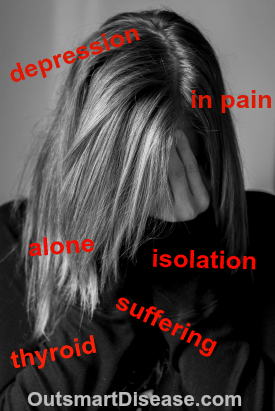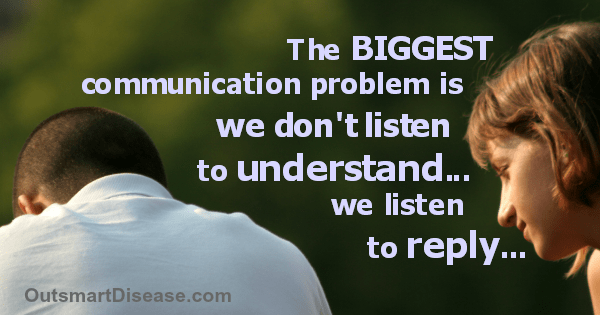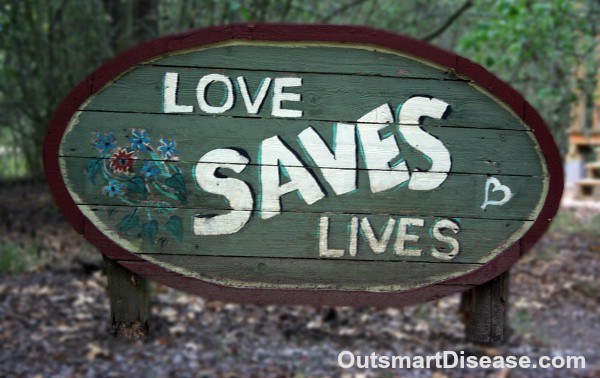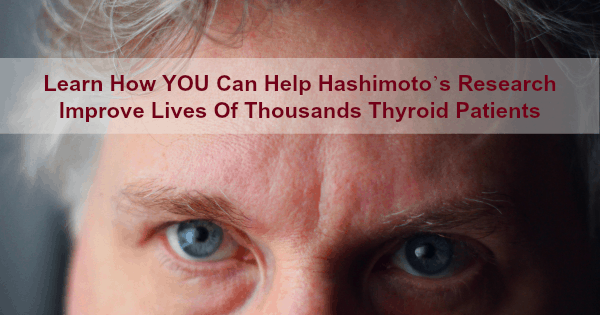As a Hashimoto’s patient you may be well aware that without new studies and reliable research data we may never change the way our current standard medical care treats hypothyroidism and Hashimoto’s patients. I am happy to tell you that today you have a rare opportunity to make your personal contribution to a Hashimoto’s research project and voice your opinion.
Furthermore, a health communication researcher asks to share your experience with autoimmune thyroid disease and how it affects one of the most important aspects of your life – your relationships.
I would like to introduce Denise K. Scannell who is a PhD candidate at George Mason University, studying health communication. She is a Hashimoto’s patient and decided to choose this autoimmune condition as a subject of her research. Today Denise will share her thoughts, personal experience and some preliminary results of her study on Hashimoto’s.
Please read this interview until the end because Denise will also explain how you can help to improve thyroid care by participating in her research study about Hashimoto’s disease.
Use this unique opportunity to tell how you feel, share your experience with Hashimoto’s and make a contribution that has a real potential to change how thyroid patients are seen and treated by their doctors.
Marina: Hi Denise! Thank you for agreeing to give me this interview. I am sure that we all will learn a lot of new things about Hashimoto’s and look at this autoimmune condition from a different prospective. But first, could you please tell Outsmart Disease readers a bit about yourself? What is YOUR Hashimoto’s story?
Denise: Hi Marina! I am glad to be here. My Hashimoto’s story is very similar to many women who read your blog. In March 2008, I gave birth to a beautiful baby boy. During my pregnancy, I had a series of “unexplained” health issues ranging from extreme swelling to chronic flu-like symptoms.
The doctors were perplexed and could not explain the health issues or the unusual 100 pound weight gain. I continued to put on weight after I had my son and also continued to have the unusual health symptoms. At one point, I weighed in at a whopping 230 pounds.
After my pregnancy, my visits to the doctor were met with lots of head scratching and even some eye-rolls. I was given a range of explanations from “your body changes as you get older” to “maybe you are depressed.” At this point, I was having severe anxiety attacks and chronic fatigue.
My doctor suggested I begin taking anti-depressants. However, I knew this was not in my head. It was not until I insisted the doctor check my thyroid that I truly got any answers. It was at that point that I was diagnosed with Hashimoto’s disease. I had no idea what that meant – but would soon learn that my challenges were just the beginning.
Marina: Why did you choose Hashimoto’s disease as a subject for your research?
Denise: I learned the lack of understanding and communication within the medical community often makes getting better an uphill, if not impossible battle.
At about the same time I started having health problems, I was accepted into the PhD program at George Mason University to study Health Communication. I had always been interested in health and the important role of communication and social support.
I wasn’t sure I could do it. I was so tired and mentally foggy that it seemed an impossible task. However, I was driven and passionate about finding answers and helping others. I am probably taking much longer than the average PhD student due to the “ups and downs” of Hashimoto’s – but I wasn’t going to let that stop me.
I am now at the end of my PhD program and starting my dissertation. I couldn’t think of a better area of research than autoimmune thyroid disease and the impact of social support and communication to improve overall wellbeing.
I decided to concentrate on this topic within the context of marital relationships for very personal reasons. Despite the fact that I found tremendous support among the Hashimoto’s community – it was very challenging to make my family and husband understand that I was indeed sick and I needed their support as well.
It made me feel very isolated. I know that I am not alone and many thyroid patients have similar experiences. I want to make a difference in the lives of people that are like me suffering in this way.
Marina: What is the title of your PhD dissertation?
Denise: Well, I wanted to title my dissertation, “In Sickness and In Health.” I decided to settle on a more academic title – “Communicating about Autoimmune Thyroid Disease: Influences on Marriage and Care Giving.”
Marina: Do you think that emotional aspects of Hashimoto’s and hypothyroidism are neglected or not properly addressed in the standard thyroid treatment? How many people are affected and need help?

Many suffering alone…
Denise: Many people associate Hashimoto’s and hypothyroidism with weight problems and metabolism. However, in many cases, the emotional and mood-related symptoms due to hypothyroidism can be more severe than the physical ones.
In the process of gathering data for my research, I learned that many patients are often misdiagnosed with a mood disorder, bipolar disorder or clinical depression instead of a thyroid problem.
One study indicated that 15 percent of screened depressed patients had an underactive thyroid. In another research article in the American Journal of Psychiatry, twenty percent of patients hospitalized because of severe depression had Hashimoto’s disease.
Marina: These numbers are astonishing!
Denise: Depression and mood swings are often overlooked in the treatment of Hashimoto’s disease and can have a devastating effect to health outcomes, social support perception and health of your relationships.
According to my research, the neglect associated with the emotional aspects of Hashimoto’s disease is widespread. Although journals across the medical and social science spectrum note the connection between Hashimoto’s and depression and other mood disorders, it is addressed as a symptom not as something that needs to be addressed to improve health outcomes.
The emotional aspects of Hashimoto’s should not be separated or ignored and truly impact everyone who has the disease.
Marina: According to findings of your research and your personal experience, what is the biggest challenge women are facing in their relationships when they have hypothyroidism and Hashimoto’s?
Denise: Hashimoto’s disease fundamentally changed who I was as a person. I no longer looked in the mirror and recognized myself. Before I started to develop the symptoms of Hashimoto’s I was an avid runner and had a wide network of friends. Afterwards, I could barely get out of bed in the morning and often preferred being alone.
Although I received initial support from friends and family, I soon found that explaining what was happening to me often fell on deaf ears. They just didn’t understand why if I was taking my thyroid medication I was still complaining of fatigue, weight issues and losing my hair. It became much easier to communicate within my thyroid community, then with my husband and my extended family and friends.
Marina: Are these personal transformations and difficulties to get understanding from friends and family are a “normal” part of thyroid disease?
Denise: According to my research, identity transformation due to illness often changes how a person views themselves and thinks about “who they are” in relation to their illness and physical and mental symptoms. Additionally, during this period of adaptation, the changes to a person’s identity often significantly impacts relationships.
Within relationships, the biggest challenge for Hashimoto’s patients is often determining how and what to communicate about their disease and how to navigate “who they are” within their current relationships.

We Don’t Listen To Understand
Hashimoto’s Disease is often associated with depression and isolation and the resulting lack of communication and support from your surrounding severely impacts wellbeing.
Intimate relationships are the key source of social support. Often the changes one experiences due to Hashimoto’s strain relationships and rob the person of potential social support from friends and family.
Marina: Based on your research how emotional support from family and friends or lack of it can affect recovery and whole treatment process in Hashimoto’s and hypothyroidism?
Denise: Social support from others has been found to assist coping and to exert beneficial effects on various health outcomes for patients.
During my data gathering phase, positive, supportive relationships were highlighted by many researchers as a key to recovery, while lack of support was shown to pose a significant risk to the patient.

Love Saves Lives
Wright, Sparks and O’Hair define social support as “the provision of care to maintain physiological and psychological wellbeing.” Emotional support is only one facet of social support. Social support extends to the informational and tangible support which we often receive within our Hashimoto’s community.
If we want to know what thyroid medications are working or what to look for in a doctor – we can usually count on our network to point us in the right direction. Emotional support is also present in our community network. I can’t tell you how many times an on-line inspirational story from one of my Hashimoto’s friends has really inspired me or helped raise my self-esteem.
However, when it comes closer to home, there can be a big gap in that support structure. As many Hashimoto’s patients realize, this illness is ever present in our daily lives. It impacts what you eat, your ability to think clearly and how you feel about yourself.
Not having support in your own backyard, affects your ability to cope with Hashimoto’s disease and comply with the necessary lifestyle and diet changes.
From personal experience, I know that going gluten and dairy free was a huge change for me and it was hard to adapt when my family failed to understand the importance of the diet change to my health. In terms of my marriage, my husband often couldn’t see what was happening with me physically and emotionally and the lack of support often impacted my ability to balance my stress level and manage my disease.
Communication is the key here.
Hashimoto’s disease in many ways can be misinterpreted and almost invisible to those around us. My husband’s big “aha” moment was when I shared Mary Shomon’s “Open letter to friends and family.” He really had no idea what was going on with me and it opened his eyes tremendously.
Marina: You often mention Hashimoto’s community. What exactly do you mean?
Denise: Good question! I am referring to those that participate in the on-line communities either through blogs, comments, sharing their stories, providing valuable information. And more importantly – those that are willing to share a “like” experience with people who need help and support.
Marina: What is the ultimate goal of your research project? How you want to change the world?
Denise: The ultimate goal for this research project is to understand what communication challenges patients with autoimmune thyroid disease are facing in their marriage and relationships and how it impacts their health and overall wellbeing.
From this understanding, I hope to create tools to be used to facilitate more effective communication and a more supportive environment to enable better health outcomes for patients with autoimmune thyroid disease.
I am a firm believer that research needs to be applied to promote effective change – and as a Hashimoto’s patient – I would love to give back to the community that has given me so much over the years to improve my health and wellbeing.
Mother Theresa once said that in order “to keep a lamp burning, we have to keep putting oil in it” – In this respect, I hope that my research will promote thyroid awareness and change to affect the lives of all those currently suffering with autoimmune thyroid disease.
Marina: How Outsmart Disease readers can help you with your research and participate in your study?
Denise: To conduct my research, I am using two methods – surveys and interviews. The survey will be used to determine overall trends as they relate to social support, communication and general perception of health.
The interviews will be used to collect stories and explore personal accounts of patients with autoimmune thyroid disease. I will use this information together to provide an overall view of the challenges and develop recommendations and tools to be used by the patients and their significant others.
I think the best way to help is to participate in my survey, and if so inclined, participate in the optional interview. My survey will be available until the end of March 2014 and can be found and completed online HERE
Marina: Who can participate in your survey?
Denise: My research is focused on autoimmune thyroid disease – so Hashimoto’s and Grave’s. The target population for my survey is women who have been diagnosed with autoimmune thyroid disease and are married, separated or divorced.
I would like to just focus on the research study about Hashimoto’s disease for really selfish reasons – but I realized that the communication aspects extend to Grave’s folks as well. So, the study is not limited to Hashimoto’s disease only.
Marina: Denise, thank you for sharing this valuable information and opportunity for thyroid patients to participate in a real research study.
Denise: Thank you so much for interviewing me for this. I truly appreciate it. And thank you for continuing to keep us all informed – your blog is terrific.

Denise K. Scannell
About The Author: Denise K. Scannell is PhD candidate at George Mason University, studying health communication. Denise was diagnosed with Hashimoto’s thyroiditis six years ago.
She decided to take a proactive position and contribute to the Hashimoto’s research by writing her PhD dissertation on how autoimmune thyroid disease affects relationships.
She resides in Warrenton, Virginia with her husband, Jeff and six-year-old son, Brady and is on a mission to make a difference in lives of many thyroid patients.
About The Hashimoto’s Research Project:
 Don’t miss this rare opportunity to improve thyroid care and wellbeing of many patients including you by participating in the research study about autoimmune thyroid disease.
Don’t miss this rare opportunity to improve thyroid care and wellbeing of many patients including you by participating in the research study about autoimmune thyroid disease.
If you are a woman with hypothyroidism, hyperthyroidism, high thyroid antibodies, Hashimoto’s or Grave’s disease here is your chance to share your experience on how thyroid disease affects your mood, relationships and your overall health.
Many thyroid patients are suffering and you can help! If you agree that we all need a change in how autoimmune thyroid disease is diagnosed and treated make your personal contribution that will take somewhere between 15 and 30 minutes of your time and complete the survey that is a part of a scientific study.
The survey will be available until the end of March 2014 and can be found online HERE
P.S. Please share this interview and link to the survey with other people you know who have autoimmune thyroid disease and may be interested to participate in this research project.
P.P.S. Do you like what you read and want to get more? Subscribe to our Thyroid News and get FREE eCourse Hypothyroidism Diet Guide



 My name is Marina Gutner, PhD. I am a researcher, medical writer, Author of forthcoming series on thyroid, hypothyroidism and autoimmune disease. I was diagnosed with autoimmune Hashimoto’s disease and hypothyroidism in 2004 and soon got so sick that I was unable to function. It took me years of research to find how to recover from severe adrenal insufficiency, stop Hashimoto’s and reduce my high dose of thyroid medication. On my blog I show you exactly how I did it so you can learn how to get started. Read more in
My name is Marina Gutner, PhD. I am a researcher, medical writer, Author of forthcoming series on thyroid, hypothyroidism and autoimmune disease. I was diagnosed with autoimmune Hashimoto’s disease and hypothyroidism in 2004 and soon got so sick that I was unable to function. It took me years of research to find how to recover from severe adrenal insufficiency, stop Hashimoto’s and reduce my high dose of thyroid medication. On my blog I show you exactly how I did it so you can learn how to get started. Read more in 











